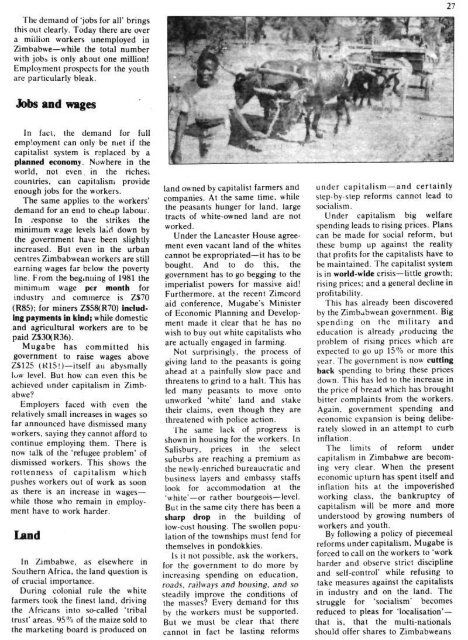Inqaba ya basebenzi Number 2 April 1981 - DISA
Inqaba ya basebenzi Number 2 April 1981 - DISA
Inqaba ya basebenzi Number 2 April 1981 - DISA
Create successful ePaper yourself
Turn your PDF publications into a flip-book with our unique Google optimized e-Paper software.
The demand of "jobs for all' brings<br />
this oul clearly. Today there are over<br />
a million workers unemployed in<br />
Zimbabwe—while the total number<br />
with job* is only about one million!<br />
Employment prospects for the youth<br />
are particularly bleak.<br />
Jobs and wages<br />
In fact, the demand for full<br />
employment can only be met if the<br />
capitalist system is replaced by a<br />
planned economy. Nowhere in the<br />
world, not even in the richest<br />
countries, can capitalism provide<br />
enough jobs for the workers.<br />
The same applies to the workers'<br />
demand for an end to cheap labour.<br />
In ."esponse to the strikes the<br />
minimum wage levels laid down by<br />
the governmenl have been slightly<br />
increased. But even in the urban<br />
centres Zimbabwean workers are still<br />
earning wages far below the poverty<br />
line. From the beginning of <strong>1981</strong> the<br />
minimum wage per month for<br />
industry and commerce is ZS70<br />
(R85): for miners Z$58(R70) including<br />
payments In kind; while domestic<br />
and agricultural workers are to be<br />
paid Z$30(R36).<br />
Mugabe has committed his<br />
government to raise wages above<br />
ZS125 (K15!)—itself au abysmally<br />
low level. But how can even this be<br />
achieved under capitalism in Zimbabwe?<br />
Employers faced with even the<br />
relatively small increases in wages so<br />
far announced have dismissed many<br />
workers, saying they cannot afford to<br />
continue employing them. There is<br />
now lalk of the 'refugee problem' of<br />
dismissed workers. This shows the<br />
rottenness of capitalism which<br />
pushes workers out of work as soon<br />
as there is an increase in wageswhile<br />
those who remain in employment<br />
have to work harder.<br />
Land<br />
In Zimbabwe, as elsewhere in<br />
Southern Africa, the land question is<br />
of crucial importance.<br />
During colonial rule the white<br />
farmers look the finest land, driving<br />
the Africans into so-called 'tribal<br />
trust' areas. 95% of the maize sold to<br />
ihe marketing board is produced on<br />
land owned by capitalist farmers and<br />
companies. At the same time, while<br />
the peasants hunger for land, large<br />
tracts of white-owned land are not<br />
worked.<br />
Under the Lancaster House agreement<br />
even vacant land of the whites<br />
cannot be expropriated—it has to be<br />
bought. And to do this, (he<br />
government has to go begging to the<br />
imperialist powers for massive aid!<br />
Furthermore, at the recent Zimcord<br />
aid conference. Mugabe's Minister<br />
of Economic Planning and Development<br />
made it clear that he has no<br />
wish to buy out while capitalists who<br />
are actually engaged in farming.<br />
Not surprisingly, the process of<br />
giving land to the peasants is going<br />
ahead at a painfully slow pace and<br />
threatens to grind to a halt. This has<br />
led many peasants to move onto<br />
unworked 'white' land and stake<br />
their claims, even though they are<br />
threatened with police action.<br />
Ihe same lack of progress is<br />
shown in housing for the workers. In<br />
Salisbury, prices in the select<br />
suburbs are reaching a premium as<br />
the newly-enriched bureaucratic and<br />
business layers and embassy staffs<br />
look for accommodation at the<br />
'white'—or rather bourgeois—level.<br />
But in the same city there has been a<br />
sharp drop in the building of<br />
low-cost housing. The swollen population<br />
of the townships must fend for<br />
themselves in pondokkies.<br />
Is it not possible, ask the workers,<br />
for the governmenl to do more by<br />
increasing spending on education,<br />
roads, railways and housing, and so<br />
steadily improve the conditions of<br />
the masses* Every demand for this<br />
by the workers must be supported.<br />
But we must be clear that there<br />
cannot in fact be lasting reforms<br />
under capitalism—and certainly<br />
step-by-step reforms cannot lead to<br />
socialism.<br />
Under capitalism big welfare<br />
spending leads to rising prices. Plans<br />
can be made for social reform, but<br />
these bump up against the reality<br />
that profits for the capitalists have to<br />
be maintained. The capitalist system<br />
is in world-wide crisis—little growth;<br />
rising prices; and a general decline in<br />
profitability.<br />
This has already been discovered<br />
by the Zimbabwean government. Big<br />
spending on the military and<br />
education is already producing the<br />
problem of rising prices which are<br />
expected to go up 15% or more this<br />
year. The government is now cutting<br />
back spending to bring these prices<br />
down. This has led to the increase in<br />
the price of bread which has brought<br />
bitter complaints from the workers.<br />
Again, government spending and<br />
economic expansion is being deliberately<br />
slowed in an attempt to curb<br />
inflation.<br />
The limits of reform under<br />
capitalism in Zimbabwe are becoming<br />
very clear. When the present<br />
economic upturn has spent itself and<br />
inflation hits at the impoverished<br />
working class, the bankruptcy of<br />
capitalism will be more and more<br />
understood by growing numbers of<br />
workers and youth.<br />
By following a policy of piecemeal<br />
reforms under capitalism, Mugabe is<br />
forced to call on the workers to 'work<br />
harder and observe strict discipline<br />
and self-control' while refusing to<br />
take measures against the capitalists<br />
in industry and on the land. The<br />
struggle for 'socialism' becomes<br />
reduced to pleas for 'localisation'—<br />
that is. that the multi-nationals<br />
should offer shares to Zimbabweans
















